“Bob’s Burger” is a sleeper hit animated adult show that started in the shadow of gigantic hits such as “South Park”, “The Simpsons” and Seth MacFarlene’s multiple shows; however as time went on, the show gained attention due to the confluence of its notably likeable characters, well-written humour, and for focusing on a functioning though financially precarious family. Nowadays “Bob’s Burger” is regarded as one the best currently-running animated shows on the Television landscape and it’s not hard to see why. Woven throughout the myriad of individual tales of the week “Bob’s Burgers” tells a simple yet enduring story of a family who, despite communally running a struggling restaurant love and support each other. The show also has a very accurate, non- stereotypical neurodiverse teenage girl in the character of Tina, providing great representation. Along with visualizing characters often not seen in the tv- scape the interplay of the cast often showcases actions which subvert and often avert common gendered stereotypes and tackles the struggle with ordinary but always stressful, economic issues in subtle and complex ways. “Bob’s Burger” has been discussed on this blog before, back when the show had only one season out, and per this writing they are engaged with season eight of their still strong run.
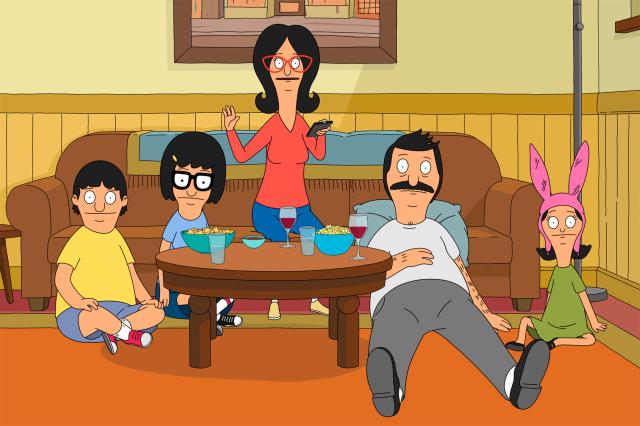
“Tina and the real ghost”, is the second episode from Season five and that seasons Halloween special. The episode starts in an appropriately spooky manner with a repair man refusing to go into the restaurant’s basement, with the adamant rebuttal that there lingers an unnatural spirit in the dark abodes of the basement. Bob is annoyed by the unprofessional behaviour, but his wife Linda and the kids get excited at the idea of a haunted storage room laying beneath the restaurant and their home. The family decides on the rational action of spending the fateful hours of the night using a Ouija board in an attempt to contact the alleged wandering spirit. While using the board, the family is informed that the ghost’s name is Jeff, and after some clever manipulation and outlandish commotion they decide that they have to lure the ghost into a shoebox where it remains captured. The children are thrilled with the idea of having a ghost in a box, seeing it as an odd form of friend or pet.
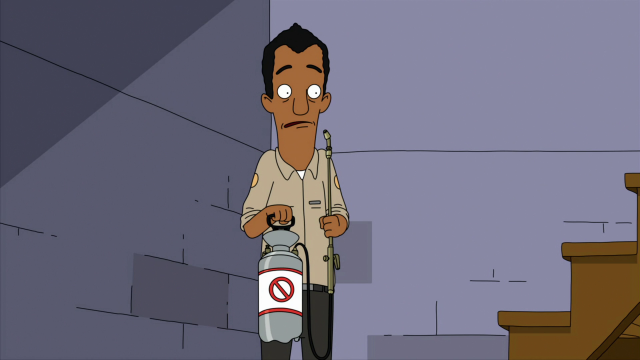
While Gene and Louise use the box to get attention from the other kids at school and Bob uses the image of a “haunted restaurant” for free publicity, Tina develops the beginnings of a relationship with Jeff the (supposed) Ghost. Taking the box on a date to a butterfly conservatory (Butterfly houses are enclosures for the breeding and display of butterfly populations) and after a butterfly lands on her mouth, Tina sees this as a sign of communication with Jeff of the most intimate display. Tina, now enamoured of the subtle moves of Jeff takes the box to school, where having a ghost boyfriend leads to Tina becoming quite popular.
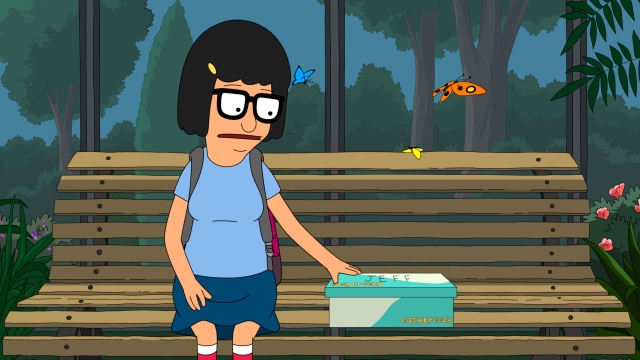
The undeniable attention Jeff and his shoebox gives to the once wallflower Tina creates a seething jealousy in the main bully Tammy. With Tammy agreeing to the obviousness of Jeff’s reality only to set the stage for a break up between Tina and Jeff, and acquiring the shoebox, and Jeff’s affection, for herself. Once again Tammy ascends to the top of the Popularity summit and Tina finds herself forlorn at school and in love. Whilst Tina mourns her loss, Louise, in her guilt at Tina’s breakdown, admits to the parents, Bob and Linda, that she played a prank on the family during the Ouija board event and move the planchette (the moveable pointer on the spirit board) to emulate a spectre and give this young ghostly presence the name Jeff. Louise tormented by her sisters pain desires to admit her deceit to Tina, but the Bob and Linda argue against this course of action to spare Tina from further sorrow. This plot twist, where the parents suggest further deception, sets up the episodes climax.
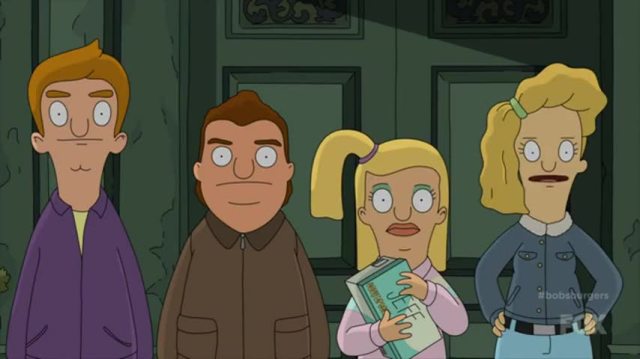
Left to right: Jimmy, Zeke, Tammy and Jocelyn
Now All Hallows eve has come around and the Belchers (the family name) children go trick-or-treating. Tina, putting on a brave face, joins her peers, including Tammy with the shoebox, and her siblings for the night. Deciding to promote the evening of Halloween eve by entering a graveyard, Things take a further creepy and unsettling turn when the group decides to enter a mausoleum.
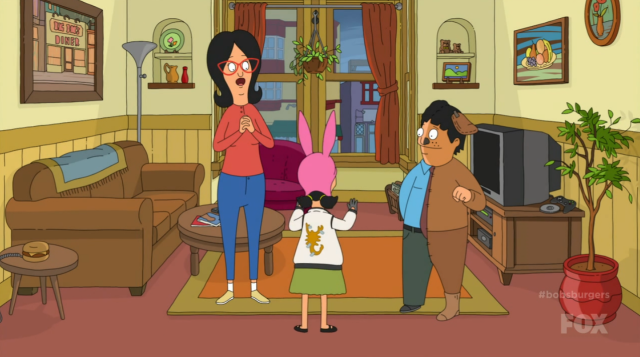
As per the usual, the door to the crypt slams shut and after all attempts fail to reopen the mausoleums’ door, the already fearful group discover a message written on the wall: “You are all trapped in here forever, signed Jeff”. Naturally panic ensues and Tammy repents of her actions in absconding with both box and Jeff. Hearkened by this situation, we as the audience are relieved as we feel the protagonist Tina will not be further bullied, but the shock comes when Tina, herself, notes that Jeff isn’t real. Tina confesses her doubts about the reality of the spectral plane and her only half playful acceptance of Jeff as existing. Noting her suspension of doubt bout ghosts was finally cut short when her suspicion of the fantasy of the ghostly world was confirmed when she overheard Louise’s confession to her parents.
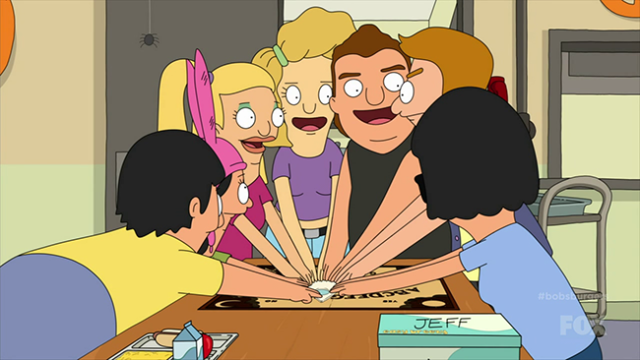
Tina starts to wonder about her own suspension of disbelief. Why did she embrace the nothingness of the myth of the ghost? She concludes to her group of friends and siblings that Jeff or his world of the spectral realm isn’t real, but the things that are desired from him still are. Jeff embodies cravings, wants and desires unfulfilled and nebulous. Tina wanted a boy to pay attention to her. Zeke, one of the kids in the gang, admits that he believed in Jeff because he desperately wanted to believe in an afterlife. Gene wanted someone to watch TV with. After the group has their epiphany, Tina states: “But we don’t need Jeff to get these things from ourselves”. The conversation is continued with: “It’s ok (that there is no afterlife) it just means we have to take advantage of the here and now”. Tina calls on herself, without a Jeff, to embrace herself. Tina shows Gene that one can watch Tv by himself (it is no reflection of being unwanted) and (as rule of funny) the group tells Tammy to stop being mean and horrible. The Group makes peace and Tina gets complimented on her prankster skills as it is revealed that she had planned and executed the entire evening.
This scene introduces in a simple, yet a very authentic depiction of arguments about the meaning of existence in a transcendental world and of sceptic response that no underlying (transcendental) world is needed to give meaning to human existence. Commonly this argument goes that without the meaning given by another (outside, higher world) there would be no meaning to this world. In this episode of ”Bob’s Burger” Tina gives a response to this rhetoric of transcendental meaning, while also understanding why some have the need for beliefs in the supernatural. The Graveyard scene is stage as a discussion of how people, for various reasons, attempt to seek comfort, hope and affirmation through their beliefs. As Tina understandably wants attention from the opposite sex, Gene desires acceptance and company, and Zeke finds the idea of life being short and eventually final terrifying. The episode operates as an honest, yet sympathetic portrayal of the many reasons for the superstitious or the belief in afterlife, but at the end of the narrative story, Tina herself, stands for the truth in the world we live in. Life and the world we live in give meanings as bounty, but often unseen in our doubts and insecurities. At last, tells Tina, life – being short and inevitably temporary – is therefore precious and should be treasured. To say yes to things, like doing things by yourself. Find meaning, especially in what makes you happy. And, as in Tina’s case, meaning is empowering oneself instead of looking for validation elsewhere.
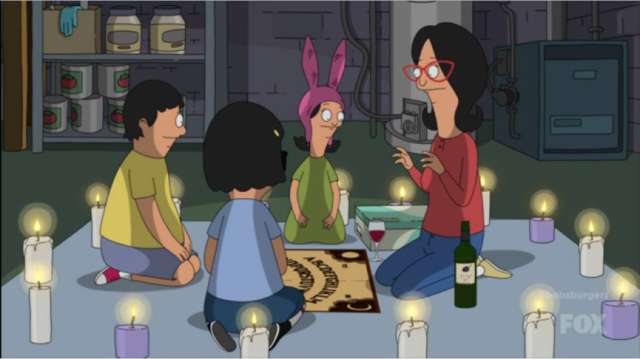
“Bob’s Burger” is interesting not only in showing a working class family with subversive gender presentation, but also provides interesting and subtle secular depictions as well. Unlike most family centric television narratives in the west, where the main leads mention or go to church seemingly regularly, “Bob’s Burger” obviously avoids the embedding of religion both in its depiction of the family and the community. Jimmy’s, a character close to the family and a love interest to Tina, causally cements this gentle abandonment with the line and philosophy ”there is nothing after death, but that’s OK”.
As more of the western world turns towards a secular, world centred meaning system, presentation is important, as well as giving vital understanding of where people of the current contemporary moment exist as life and philosophy. The scene with the kids in the mausoleum gives a pitch-perfect depiction of such. It is honest and a sweet, optimistic alternative way of viewing life: we can give to yourselves meaning and importance, despite there being no supernatural forces.










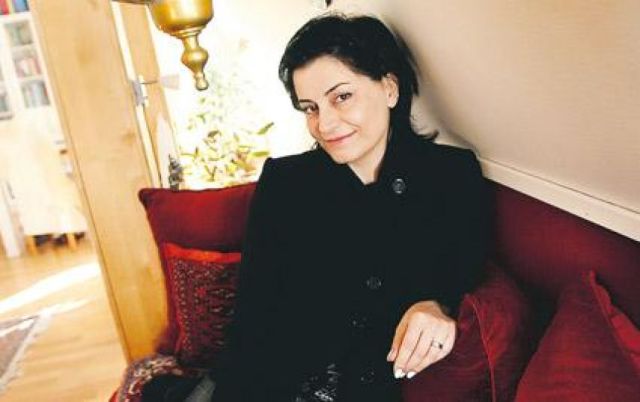













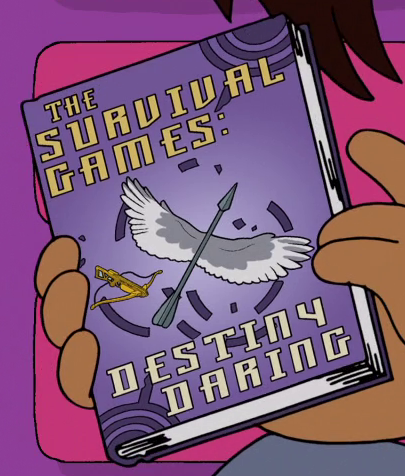


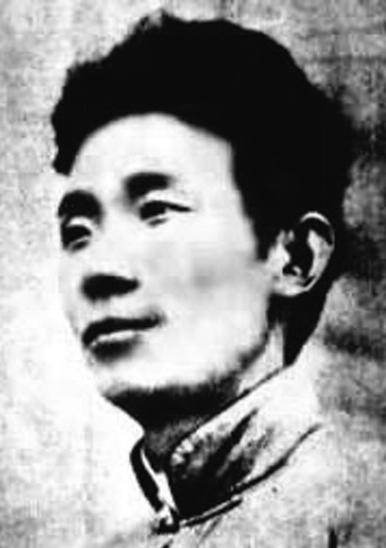



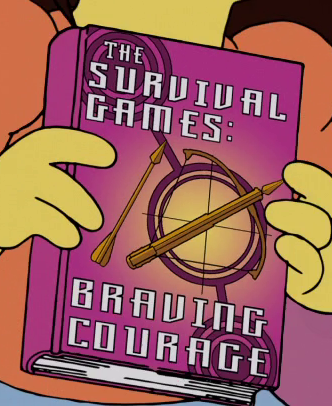
The Bark Of The Atheist – Brian Griffin And The Hop Forward And Two Leaps Back
“Family Guy” is a pretty unique animated show that awakes many different emotions in me– some very good, some very bad. The show is a true, surrealistic rollercoaster. I enjoyed the shows first couple of seasons, but honestly have hated the last couple of seasons, due to repetitive nasty hits at overweight women and badly written characters. I digress though.
The series centers on the Family Griffith, who is contain of Peter, the usually dimwitted, politically incorrect, child-like, and spiteful main star, his phenomenally beautiful wife Lois, and their three children. The oldest is the outcast, brutally bullied teenage daughter Meg, the early teen Chris who like his father is a bit slow, and the evil genius infant Stewie. The family also has, of course, a pet: the talking, wise human-like dog Brian, who this post will be about.
Brian, despite being the pet of the family, functioned as the voice of reason for the earlier years of the show. He was portrayed as a liberal, reasonable and unhappily in love with Lois as well as a bit of a drinker, though intermittently. Brian was shown on several occasions as being critical of religion, but it wasn’t until the seventh season, in the episode “Not all dogs go to heaven”, when the series finally “outed” Brian as an atheist. In the Episode, Brian, due to Meg’s sudden conversion to Christianity and attempt push to bring Brian into the “flock” of her church (and their form of Christianity), gently laughs and states: “You’re barking up the wrong tree, Meg. I’m an atheist”. When watching this episode, I was at first blush overjoyed at first at this radical act (seeing how being non-religious is still taboo on TV), but then began to reconsider what this act would mean and my first hesitations seem born out after the show’s recent episodes featuring Brian as the main protagonist which show character flaws wildly out of synch even for this genre. I cannot but wonder: is Brian really a positive portrayal of atheism? Or does his character just re-enforce negative stereotypes or images of us non-believers?
***Spoilers may be below!***
Let’s first look at how the writers of “Family Guy” talk about the experience of being an atheist in the States. “Not all dogs go to heaven” was a brilliant episode in this case, showing all the prejudice Brian meets after Meg gossips to the whole town about his atheism. Brian is not allowed to go to from such divergent venues as liquor stores to libraries, and is ridiculed on TV for being “worse than Hitler”. Admittedly, some of the discrimination may seem exaggerated; however there is something unsettlingly true in the depiction as well. To some religious folks, not believing in god is the worst possible sin, making us even worse than serial killers or mass murderers (especially if the criminals happen to believe in god). This is a pretty extreme belief and actively held by some, and which is portrayed comically in “Family Guy” when the intensely religious News-People announce Brian to be by far worse than Hitler.
Brian also gets brutally (yet only verbally) attacked by Lois and Peter after his confession. Lois states: “We believe in god in this family!” which showed how sometimes even people close to non-believers can be unsympathetic and dismissive to a theoretical structure struggled to be achieved. Brian gives even in to this pressure to “believe” temporarily, pretending to have “found god”, since he can’t take the peer pressure. But after witnessing Meg burning books about science (since she feels they are contrary to the “statements of God”) Brian gives a harsh talk to Meg, crushing her belief. The speech is devastating to Meg, since Brian points out some painful things to Meg about her life and how that is really what has spawned her beliefs. To this Brian then gives a more hopeful, comforting speech. The whole episode, in my opinion, is a perfect way of telling not only what it can sometimes feel like to be an atheist, as one can in a cartoon, but also is good in showing that Brian is a caring person, crushing the stereotype of the heartless cold atheist.
Meg trying to convert Brian
Brian was portrayed in a positive light during most of the output of the show. He had his flaws, but always came through with reason, compassion, and self-reflection underlying his thoughts and actions. It was in Season Eight where Brian started to become decidedly more odd and began a run of doing questionable things with little intellectual nuance or moral underpinnings. Take as an example of this the Episode “Brian writes a bestseller”, from Season Nine. In this episode Brian is depressed over his published novel doing so poorly, stating to Stewie that only trash literature and phony self-help books make it big. To prove his point he writes one himself and publishes it. It becomes a bestseller, making Brian famous and rich, sweaping him away to the hinterlands of fame, recognition and media adulation, and making him along the way into an arrogant, megalomaniac and mean spirited person. He comes to treat those around him as mere props to his existence (including Stewie who has facilitated his empty rise) and who seem to be considered by him now mere objects to satisfy his random and arbitrary desires. In particular harsh scenes, Brian is shown yelling at Stewie and verbally abusing him for anything that annoys him. This, in a number of painful scenes brings Stewie to tears and self doubt over his supposed lack of abilities to gratify the chance cravings of Brian.
The episode’s climax comes when Brian is invited onto “Real Time with Bill Maher”, a real show hosted by one of Americas most famous non-believers. Maher trashes the book heavily, making Brian confess that he wrote the best seller in a day, and that he doesn’t really believe in anything written in the book. Maher then tells Brian that he is the lowest of the low, since if one is going to bullshit; they should have the “honesty to stand by their bullshit”. Brian, coming somewhat back to his normal self after the harsh critique returns home where he talks a little to Stewie saying that he knows the book was dumb and his behavior inappropriate in extreme.
However, even at this point of the narrative – where a reasonable lesson has been learn and self-reflection is re-imposed by the awareness of the emptiness of his fame – Brian openly admits he will not apologize to Stewie for mistreating him. Here Brian is made into a truly horrible person, who not only doesn’t apologize after treating someone so poorly, but also a person who is actually so arrogant he refuses to learn from mistakes.
Brian at this juncture of the show (and others which are embed in these later seasons, and which can be recounted, but will merely “add” to the direction being taken in this case episode presented here) is made into such a terrible person that it is quiet imperative to reconsidered whether it is good his character is one of the few out-ted atheist characters on TV or not. Since there are so few atheist protagonists around, it is important that at least some of the more famous ones would not strengthen the stereotype that we’re morally-vacuous, empty-elitists, and intellectually-devious self-gratifies which no genuine concern for others beyond the narrowest of evil self-interest who wish to contaminate and spoil. Brian, in this episode, in bodied the stereotype to a max.
Brian was also shown to perhaps not truly stand for any of the opinions he’s expressed in the show, since he abandoned them all in the episode “Excellence in Broadcasting”. Brian, in the episode, becomes a republican and so conservative, he actually tries to go and waterboard – torture – a Democrat (the” supposedly” more left-leaning, worker-supporting party in the United States). Lois pinpoints in the episode that Brian has a need to go against the stream, to always have the more “unpopular” opinion. If that is the case, and Brian really gets all his opinions that way, does that mean he is only an atheist since they are a minority? Not only does this make Brian seem childish, but makes everything he said in previous episodes unimportant. So it is impossible to take his atheism seriously.
There was also the misfortune of Brian actually trying to force Lois to kiss him (maybe even more) in “Play it again, Brian”, a episode from season six. This act of creepiness and slight (though significant) violence towards a woman was before he was outed as an atheist (in a later season), which in a way makes him a lost case as a “model” for an acceptable and representative non-believer from the start.
I want to like Brian’s character. Aside from Dr. House from “House” (who is a total stereotype of the mean, miserable atheist) and Dr. Temperance Brennan from “Bones”, Brian is one of the most mainstream portrayals of atheist in popular culture. Yet his character was made so completely unlikeable and unreliable in the later seasons of the show, it feels like a disfavor for non-religious people that Brian was ever made a openly atheist character.
Seth Macfarlane, the creator of “Family Guy” and voice talent of Brian, also made his other characters, Haylee Smith and Roger the alien from “American Dad!”, atheist. But even these characters don’t really do much for the atheist community. Haylee is bland and hardly does anything memorable, and Roger is a sociopath who seems able to be anything which can temporary satisfaction.
What is lacking from popular culture is an atheist character that is portrayed as likeable. Few Medias have done this.
Daria Morgendorffer, from the animated series “Daria”, was done well, and somewhat outed as an atheist in the last season. Also Mal from “Firefly” was a good atheist character: anti-hero who despite some flaws was a good person. However, these shows have been cancelled or are off the air now. I was hopeful Brian would be the next Daria or Mal, but no such luck. Seems like we atheists have to wait a little longer for a more positive depiction.